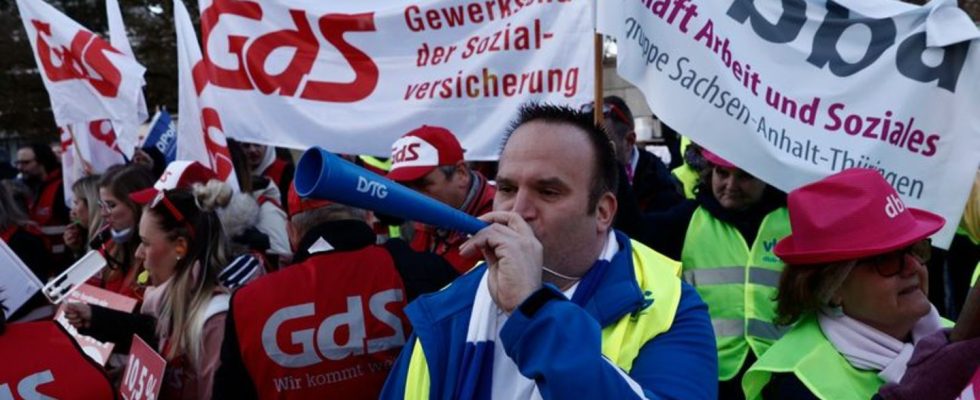wages
Collective bargaining dispute in the public sector: compromise found
Members of various professional groups at a protest by the Verdi service union in Berlin. photo
© Carsten Koall/dpa
After hours of negotiations in Potsdam, trade unions and employers agree on a “historic” wage increase. The municipalities see additional costs in the billions.
With the largest wage increase in decades, the drastic increase in consumer and energy prices will be cushioned for around 2.5 million employees in the public sector. The federal government, local authorities and unions agreed on this late on Saturday evening after another tough round of negotiations in Potsdam. Employees of the federal states are not affected by this, a separate collective agreement applies to them.
First of all, tax and duty-free one-off payments totaling 3,000 euros are intended to dampen the effects of inflation on federal and local employees. The first 1240 euros from it are already available in June. From July and until February 2024, 220 euros will flow each month.
“Largest tariff increase in post-war history”
According to the agreement, from March 2024 the employees will then receive a basic amount of EUR 200 gross per month as well as a subsequent increase of 5.5 percent – but at least EUR 340 gross more. The term of the new collective agreement is 24 months. With the conclusion, the bargaining parties adopted the core points of the arbitration recommendation published last week.
“This is the largest tariff increase in post-war history in the public sector,” said Verdi boss Frank Werneke after the talks. Federal Interior Minister Nancy Faeser (SPD) emphasized that with this degree, a cleaning worker in the public sector could receive 360 euros or 13.3 percent more in the future. Werneke said: “As part of this collective bargaining agreement, a nurse gets a permanent monthly pay increase of 400 euros. Or a garbage worker of 357 euros.” This corresponds to an increase of 13.4 percent.
“Most Expensive Collective Agreement Ever”
“We are aware of our great responsibility for employees, for public budgets, for social justice and for a strong and capable state,” said Faeser late on Saturday evening. The total cost of the contract for the agreed term for the federal government was around 4.95 billion euros. “We accommodated the unions as far as we could still be responsible for in the difficult budgetary situation,” said Faeser.
The municipalities are even assuming a multiple of this burden. The President of the Association of Municipal Employers’ Associations, Karin Welge, spoke of the “most expensive collective bargaining agreement of all time”, which will cost the already cash-strapped cities and communities around 17 billion euros. “The municipal employers went to the financial limit with this compromise,” said Welge after the agreement. “And I think the package as a whole is impressive.”
“We would have liked a stronger social component”
Verdi and the German Association of Civil Servants had originally demanded 10.5 percent, but at least 500 euros more per month, referring above all to the heavy burden on employees due to high inflation. According to data from the Federal Statistical Office, food price increases in March alone reached 22.3 percent year-on-year, the highest level since the outbreak of war in Ukraine at the end of February 2022.
The new collective agreement does not achieve these rates of increase. All parties emphasized the compromise character of the agreement. “We would have liked a shorter term, we would have liked a more pronounced social component,” said Verdi boss Werneke. Nevertheless, the dbb chairman Ulrich Silberbach emphasized: “We have an inflation compensation premium, which now helps over the mountain in the initial phase.”
After months of negotiations and three unsuccessful rounds of wage disputes, there was an arbitration process. The core points of the compromise proposal that came about around a week ago have now been accepted unchanged by the social partners.
“Biggest warning strike participation in many years”
Verdi saw his negotiating position strengthened by the massive warning strikes. Werneke spoke of the “largest warning strike participation for many years and decades”.
The collective bargaining agreement applies to thousands of professions – including educators, bus drivers, pool employees, firefighters, nurses, administrative employees, geriatric nurses, sewage treatment plant employees, foresters and doctors. It is about the income of more than 2.4 million employees of the municipal employers and 134,000 of the federal government.
Verdi and the civil servants’ association are now letting their own members vote on the decision made on Saturday. However, Werneke expressed his conviction that he could win the members over to the agreement.

